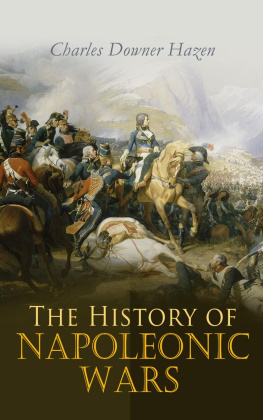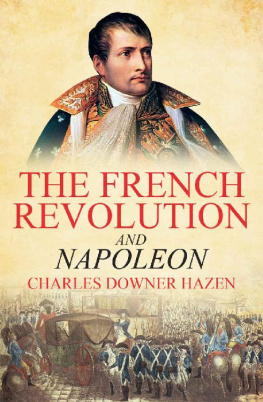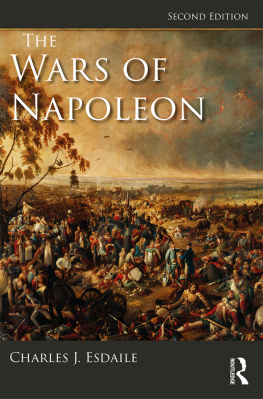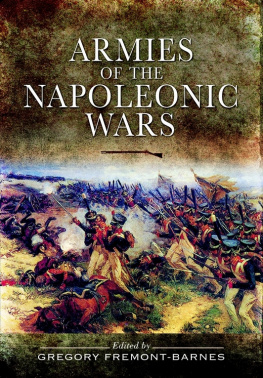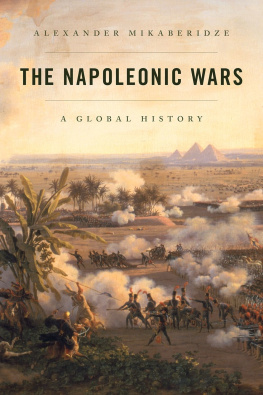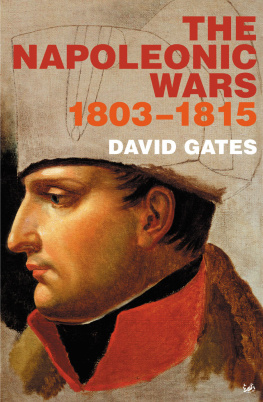The First Wars (The Era of Directory)
Napoleon Bonaparte was born at Ajaccio in Corsica in 1769, a short time after the island had been sold by Genoa to France. The family was of Italian origin but had for two centuries and a half been resident in the island. His father, Charles Bonaparte, was of the nobility but was poor, indolent, pleasure-loving, a lawyer by profession. His mother, Laetitia Ramolino, was a woman of great beauty, of remarkable will, of extraordinary energy. Poorly educated, this "mother of kings" was never able to speak the French language without ridiculous mistakes. She had thirteen children, eight of whom lived to grow up, five boys and three girls. The father died when the youngest, Jerome, was only three months old. Napoleon, the second son, was educated in French military schools at Brienne and Paris, as a sort of charity scholar. He was very unhappy, surrounded as he was by boys who looked down upon him because he was poor while they were rich, because his father was unimportant while theirs belonged to the noblest families in France, because he spoke French like the foreigner he was, Italian being his native tongue. In fact he was tormented in all the ways of which schoolboys are past masters. He became sullen, taciturn, lived apart by himself, was unpopular with his fellows whom, in turn, he despised, conscious, as he was, of powers quite equal to any of theirs, of a spirit quite as high. His boyish letters home were remarkably serious, lucid, intelligent. He was excellent in mathematics, and was fond of history and geography. At the age of sixteen he left the military school and became a second lieutenant of artillery. One of his teachers described him at this time as follows: "Reserved and studious, he prefers study to amusement of any kind and enjoys reading the best authors; is diligent in the study of the abstract sciences, caring little for anything else. He is taciturn and loves solitude, is capricious, haughty, and excessively self-centered. He talks little but is quick and energetic in his replies, prompt and incisive in repartee. He has great self-esteem, is ambitious, with aspirations that will stop at nothing. Is worthy of patronage."
Young Bonaparte read the intoxicating literature of revolt of the eighteenth century, Voltaire, Turgot, particularly Rousseau. "Even when I had nothing to do," he said later, "I vaguely thought that I had no time to lose." As a young sub-lieutenant he had a wretchedly small salary. "I have no resources here but work," he wrote his mother. "I sleep very little. I go to bed at ten, I rise at four. I have only one meal a day, at three o'clock." He read history extensively, regarding it as "the torch of truth, the destroyer of prejudice." He tried his hand at writing, essays, novels, but particularly a history of Corsica, for at this time his great ambition was to be the historian of his native land. He hated France and dreamed of a war of independence for Corsica. He spent much time in Corsica, securing long furloughs, which, moreover, he overstayed. As a consequence he finally lost his position in the army which, though poorly salaried, still gave him a living. He returned to Paris in 1792, hoping to regain it, but the disturbed state of affairs was not propitious. Without a profession, without resources, he was almost penniless. He ate in cheap restaurants. He pawned his watch and, as an idle but interested spectator, he witnessed some of the famous 'days' of the Revolution, the invasion of the Tuileries by the mob on the 20th of June, when Louis XVI was forced to wear the bonnet rouge, the attack of August 10 when he was deposed, the September Massacres. Bonaparte's opinion was that the soldiers should have shot a few hundred, then the crowd would have run. He was restored to his command in August,1792. In 1793 he distinguished himself by helping recover the Republic Toulon for the Republic and in 1795 by defending the Convention against the insurrection of Vendemiaire, which was a lucky crisis for him.
Having conquered a Parisian mob, he was himself conquered by a woman. He fell madly in love with Josephine Beauharnais, a widow six years older than himself, whose husband had been guillotined a few days before the fall of Robespierre, leaving her poor and with two children. Josephine did not lose her heart but she was impressed, indeed half terrified, by the vehemence of Napoleon's passion, the intensity of his glance, and she yielded to his rapid, impetuous courtship, with a troubled but vivid sense that the future had great things in store for him. "Do they" (the Directors) "think that I need their protection in order to rise?" he had exclaimed to her. "They will be glad enough some day if I grant them mine. My sword is at my side and with it I can go far." "This preposterous assurance," wrote Josephine, "affects me to such a degree that I can believe everything may be possible to this man, and, with his imagination, who can tell what he may be tempted to undertake? "
Two days before they were married Bonaparte was appointed to the command of the Army of Italy. His sword was at his side. He now unsheathed it and made some memorable passes. Two days after the marriage he left his bride in Paris and started for the front, in a mingled mood of desperation at the separation and of exultation that now his opportunity had come. Sending back passionate love-letters from every station, his spirit and his senses all on fire, feeling that he was on the very verge of achievement, he hastened on to meet the enemy and, as was quickly evident, "to tear the very heart out of glory." The wildness of Corsica, his native land, was in his blood, the land of fighters, the land of the vendetta, of concentrated passion, of lawless energy, of bravery beyond compare, concerning which Rousseau had written in happy prescience twenty years before, "I have a presentiment that this little island will some day astonish Europe." That day had come. The young eagle it had nourished was now preening for his flight, prepared to astonish the universe.
The difficulties that confronted Bonaparte were numerous and notable. One was his youth and another was that he was unknown. The Army of Italy had been in the field three years. Its generals did not know their new commander. Some of them were older than he and had already made names for themselves. They resented this appointment of a junior, a man whose chief exploit had been a street fight in Paris. Nevertheless when this slender, round-shouldered, small, and sickly-looking young man appeared they saw instantly that they had a master. He was imperious, laconic, reserved with them. " It was necessary," he said afterward, "in order to command men so much older than myself."
He was only five feet two inches tall but, said Massena, "when he put on his general's hat he seemed to have grown two feet. He questioned us on the position of our divisions, on the spirit and effective force of each corps, prescribed the course we were to follow, announced that he would hold an inspection on the morrow, and on the day following attack the enemy." Augereau, a vulgar and famous old soldier, full of strange oaths and proud of his tall figure, was abusive, derisive, mutinous. He was admitted to the General's presence and passed an uneasy moment. "He frightened me," said Augereau, "his first glance crushed me. I cannot understand it."
It did not take these officers long to see that the young general meant business and that he knew very thoroughly the art of war. His speech was rapid, brief, incisive. He gave his orders succinctly and clearly and he let it be known that obedience was the order of the day. The cold reception quickly became enthusiastic cooperation.

